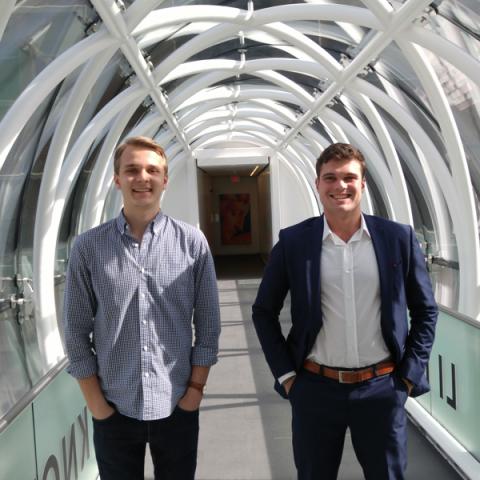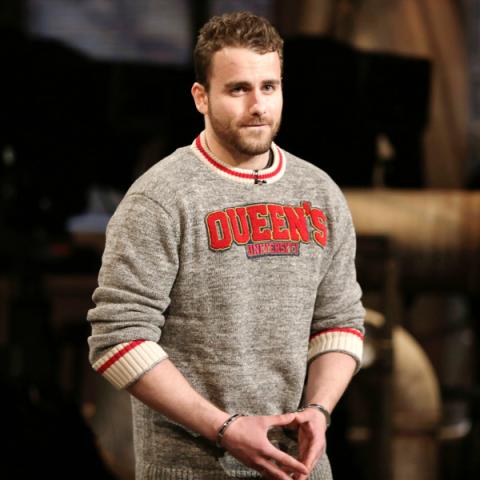Start-Ups Snapshot 2018
Carmody
My company, Carmody, is a Canadian luxury statement knitwear brand for women. Proudly designed and hand-finished in Canada, and crafted in the U.S., our pieces are created with time and care using high-quality alpaca fibre sourced from Peru. Women should never have to sacrifice beauty for durability. Carmody pieces are designed to be both functional and fashionable. They’re made to be passed down from generation to generation.
Why I started the company: Growing up in Canada, I faced a regular challenge every fall: finding Canadian brands that sold stylish knitwear that was versatile enough to wear both in an office setting and out on weekends. I wanted a sweater that was cosy yet fashionable, and also high quality and unique. Carmody aims to fill that void by designing statement pieces that are easy to wear.
What business problem does your company solve? Canadian consumers value products of high quality and are conscious of where these items come from. At Carmody, we strive to be transparent about our materials and are adamant about maintaining production in North America. With these ideals in mind, I created Carmody to have a classic and heritage feel, exemplified by the incorporation of hand knitting characteristics.
The most fun I’ve had so far was when I got to hand deliver a Carmody knit to a customer and see the reaction upon unpacking the box. We invest a lot of time and effort into making each order an excellent experience for the customer. All of our knits are packaged in our signature Carmody box, which includes additional surprises for the customer.
Iris Technologies
Why I started the company: Conor and I set out to solve a problem we have first-hand experience with: computer use triggering concussion-related symptoms during recovery. In Canada and the U.S., there are roughly four million new concussions each year. Computer intolerance is a large issue in today’s computer-driven society, as it can often force students to take time off school or employees to go on short-term disability.
What business problem does your company solve?
Severe concussion reduces an individual’s cognitive ability as well as his or her sensory capacity to process light, noise and motion. These symptoms prevent the use of LCD screens during recovery, as certain features can trigger concussion symptoms. Our product, a 13.3-inch secondary computer monitor that uses e-paper technology, does not have the backlighting and pixel refresh rate found in its LCD counterparts, which allows users to stay connected and maintain productivity during their recovery.
Something we tried that didn’t work: We tried to sell the device to professional athletes. We originally thought that due to the high probability of an athlete sustaining a concussion, it would be a great market for Iris. After a few conversations with sports teams, we soon realized that while there is no shortage of concussions in the professional sports world, pro athletes do not have as much need to use a computer during their recovery as a student or employee.
Ioffe Biotechnologies Inc.
My company, Ioffe Biotechnologies, was created to optimize human health and performance. Our first product to market is an over-the-counter pill called Indezone, which has been approved by Health Canada with the health claim, “Helps to enhance cognitive performance”. For boosting brain function, it's more effective than coffee and energy drinks, but safer than prescription stimulants.
Why I started the company: During my undergraduate studies in genetics, I had some ideas for a new technology to treat disease in humans — one that didn't involve drugs or vaccines. I incorporated Ioffe Biotechnologies as a means to gain access to rentable lab space to develop a new treatment for an auto-immune disease. At that time, I was also diagnosed with narcolepsy, excessive daytime sleepiness. It was not my original intention to bring Indezone to market. I was looking for a way to boost my own performance while juggling my undergrad and a biotech startup. But the product fell in line with my overall vision and strategy for the company of optimizing human performance. It made sense to commercialize Indezone.
What business problem does your company solve? Up to 29 per cent of students have turned to prescription stimulants, like Ritalin or Adderall, to keep up with their academics. Evidently, coffee and energy drinks aren't enough for today's fast-paced lifestyle. Indezone offers a new way to improve brain function; one that's more effective than coffee or energy drinks, but still regulated and accessible without a prescription. (Indezone’s ingredients include L-Tyrosine, a naturally occurring amino acid, caffeine and vitamin B6.)
The most fun I’ve had so far was when I had the opportunity to pitch Indezone on the CBC show Dragons’ Den. I wasn’t able to strike a deal,
but the media exposure and professional advice I received was extremely valuable.
A Smith School of Business connection: I integrated this company into my MBA curriculum for the Independent Project and have been fortunate enough to be surrounded by mentors and experts from Smith and Queen's. Sharan Raghubir, EMBAA’13, was my appointed advisor for the Independent Project and did a great job with guidance and mentorship throughout the program. JP Shearer has been a big help with extracurricular opportunities. All of the faculty and my classmates at Smith have been supportive.



